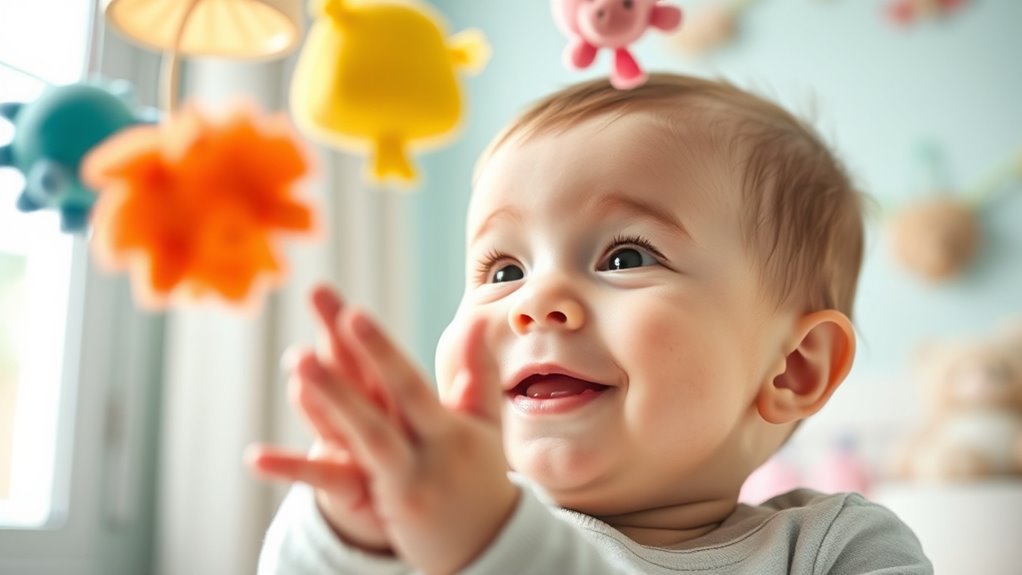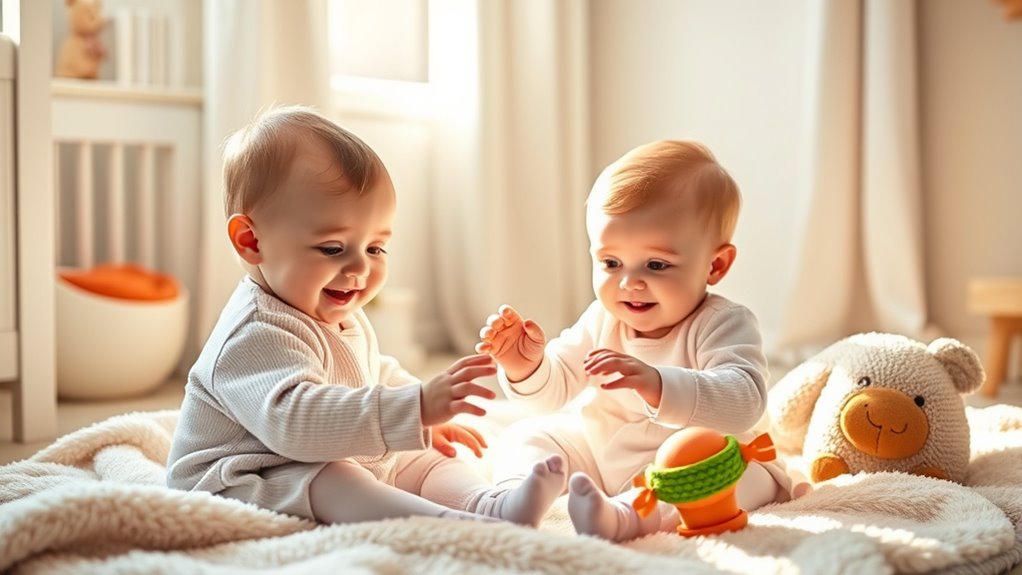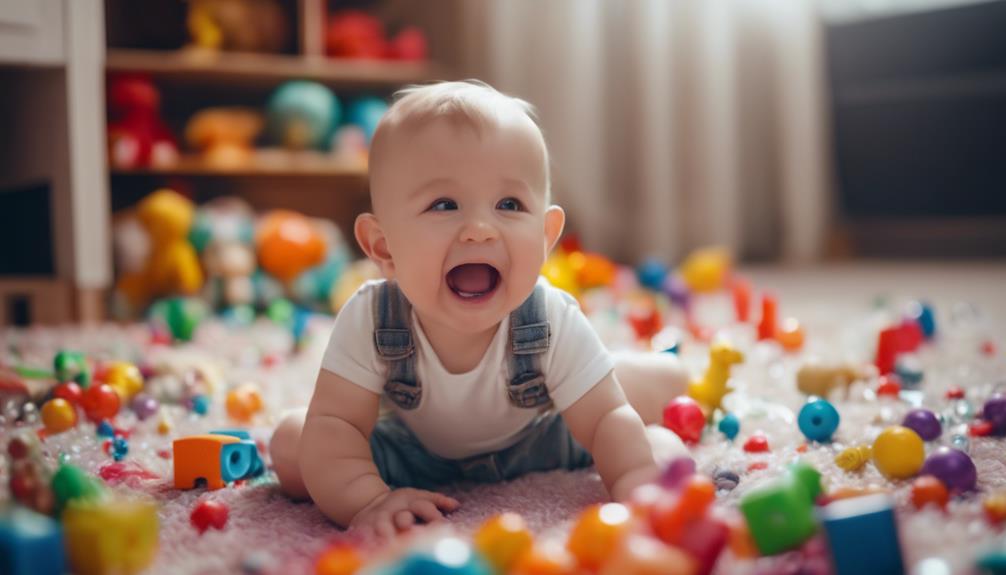To nurture your infant’s social skills early, focus on playful, responsive interactions like smiling, singing, and making funny faces to create a joyful environment. Respond promptly to their needs with gentle touches and eye contact to build trust and emotional bonds. Incorporate routines like feeding and cuddling as opportunities for warm communication. These simple but consistent efforts help your baby develop confidence, understanding, and social awareness that will benefit their future relationships—discover more about fostering these essential skills.
Key Takeaways
- Engage in playful interactions using toys, facial expressions, and sounds to promote communication and emotional understanding.
- Respond promptly and consistently to your baby’s needs to build trust and strengthen emotional bonds.
- Incorporate talking, singing, and cuddling into routine activities like feeding and diaper changes to foster social skills.
- Create a nurturing environment that encourages exploration and social interactions, shaping confident and secure behavior.
- Be present, responsive, and playful to help your infant develop empathy, emotional security, and healthy relationship skills.

Have you ever wondered how social interactions shape a baby’s development? From the moment they’re born, your baby begins to learn about the world through interactions with you and those around them. These early exchanges are essential for developing social skills, and you can actively nurture this process with simple, intentional actions. One of the most effective ways to do this is through playful interactions. When you engage in play, you create a joyful environment that encourages your baby to communicate, explore, and connect. Use toys, facial expressions, and sounds to make the interaction lively and engaging. Smiling, singing, and making funny faces are not just entertaining—they teach your baby about emotional cues and social cues, laying the foundation for empathy and understanding later on. Playful interactions also boost your baby’s confidence, helping them feel safe and loved as they experiment with new sounds and gestures.
Engage in playful interactions to foster your baby’s social skills and emotional confidence from the start.
Alongside play, emotional bonding plays a fundamental role in shaping your baby’s social development. When you respond promptly and consistently to your baby’s needs, you foster a sense of trust that’s essential for healthy emotional growth. Gentle touches, eye contact, and soothing words strengthen your connection and help your baby recognize that they are loved and valued. This emotional bonding creates a secure base from which your baby feels comfortable exploring social situations outside of your immediate circle. As they grow, this secure attachment encourages them to approach others with curiosity rather than fear, making social interactions less intimidating. Research shows that early social experiences significantly influence a child’s ability to form healthy relationships later in life.
You can also nurture emotional bonding during routine activities like feeding, diaper changes, or cuddling. These moments are opportunities to establish a rhythm of responsiveness and affection. When you talk to your baby during these times, describing what you’re doing or sharing your feelings, you help them understand emotional expressions and develop their own communication skills. Consistent, warm interactions teach your baby that they are safe and that their feelings matter, which is fundamental for developing empathy and social awareness later in life.
Incorporating playful interactions and prioritizing emotional bonding into your daily routine creates a nurturing environment that promotes healthy social skills. Remember, your baby is constantly absorbing information from your reactions and behaviors. By being present, responsive, and playful, you’re shaping a confident, emotionally secure little person ready to engage meaningfully with the world around them. These early social experiences are the building blocks for lifelong relationships, and your active participation makes all the difference.
Frequently Asked Questions
When Should I Start Socializing My Baby With Other Children?
You can start socializing your baby with other children as early as 3 to 6 months. During this time, you can introduce tummy time to help your baby develop motor skills and encourage interaction. As your baby grows, plan gentle playdates around their comfort level. These early social experiences help your little one build confidence and social skills, setting a strong foundation for future interactions.
How Can I Tell if My Infant Is Developing Social Skills Properly?
You can tell your infant is developing social skills properly when they show signs of emotional recognition, like smiling or responding to your tone. Observe their reactions during caregiver interactions; if they seek eye contact, mimic facial expressions, or become comforted by your presence, it’s a good sign. These behaviors indicate healthy social development, driven by your consistent engagement and nurturing responses that foster their emotional and social growth.
Are There Specific Toys That Encourage Social Development Early?
You might think toys don’t matter much, but your infant’s social skills can thrive with the right choices. Interactive toys and musical instruments encourage your baby to mimic sounds, share attention, and engage with others. These toys foster early social interactions, turning playtime into a bonding opportunity. So, don’t underestimate simple tools—your little one’s social development can blossom with toys that invite participation and communication.
How Do I Handle My Baby’S Stranger Anxiety Effectively?
When your baby shows stranger anxiety, stay calm and patient. Use playdate tips like gradually introducing new people and keeping interactions brief. Encourage gentle stranger interaction by smiling and talking softly, and let your baby observe at their own pace. You can also comfort them with a favorite toy or blanket. Over time, these positive experiences help your baby build confidence and feel more secure around new faces.
What Activities Promote Bonding and Social Skills Simultaneously?
To promote bonding and social skills, you should try engaging your baby in playgroup activities and parent-child classes. These activities create opportunities for your little one to interact with peers and caregivers in a supportive environment. You actively participate, encouraging your baby to explore, share, and communicate. This not only strengthens your bond but also helps your infant develop essential social skills naturally and enjoyably.
Conclusion
By nurturing your baby’s social skills early, you’re setting a foundation for confident, empathetic interactions later on. For example, imagine your little one smiling and waving at a neighbor, feeling safe to connect. These small, everyday moments build trust and social understanding. Keep engaging with your baby through play and conversation, and you’ll help them develop the skills they need to thrive socially. Your gentle guidance today shapes their confident interactions tomorrow.










